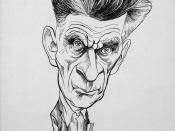Analysis of Samuel Beckett's Waiting for Godot
Waiting for Godot is an absurd play by Samuel Beckett. It tells about two tramps (Estragon and Vladimir) who are waiting by a tree for the arrival of Mr. Godot. Estragon and Vladimir through the play have made no progression: waiting for Godot. The play is primarily about hope. It revolves around Vladimir and Estragon and their pitiful wait for hope to arrive. The hopelessness of their lives described by the phrase "Nothing to be done".
A direct result of this hopelessness is the daily struggle of how to pass the time. Most of the play tells about their efforts which will help them pass the time. This explains why they stay together. Both Vladimir and Estragon admit to being happier when they apart so the main reason why they continue their relationship is because they need one another to pass the time.
Since passing the time is their mutual occupation, they try to find games to help them achieve their goal. As a result, they engage in insulting one another and in asking each other question. Conversation to both is a game to pass the time until Godot comes. There were also times when they consider suicide as another way of escaping their hopelessness. Estragon wants them to hang themselves, but they find it would be too risky.
About the language, this play serves the characteristics of absurd play's conversation. The most distinguished characteristic is repetition. We can see many repetitions in this play. These repetitious conversations symbolize the lack of meaning in life. This play is a repetition of circular motions, echoes, actions, and gestures.
Estragon: Let's go
Vladimir: We can't
Estragon: Why not?
Vladimir: We're waiting for Godot.
This conversation occurs several times in the play. Estragon's requests...


